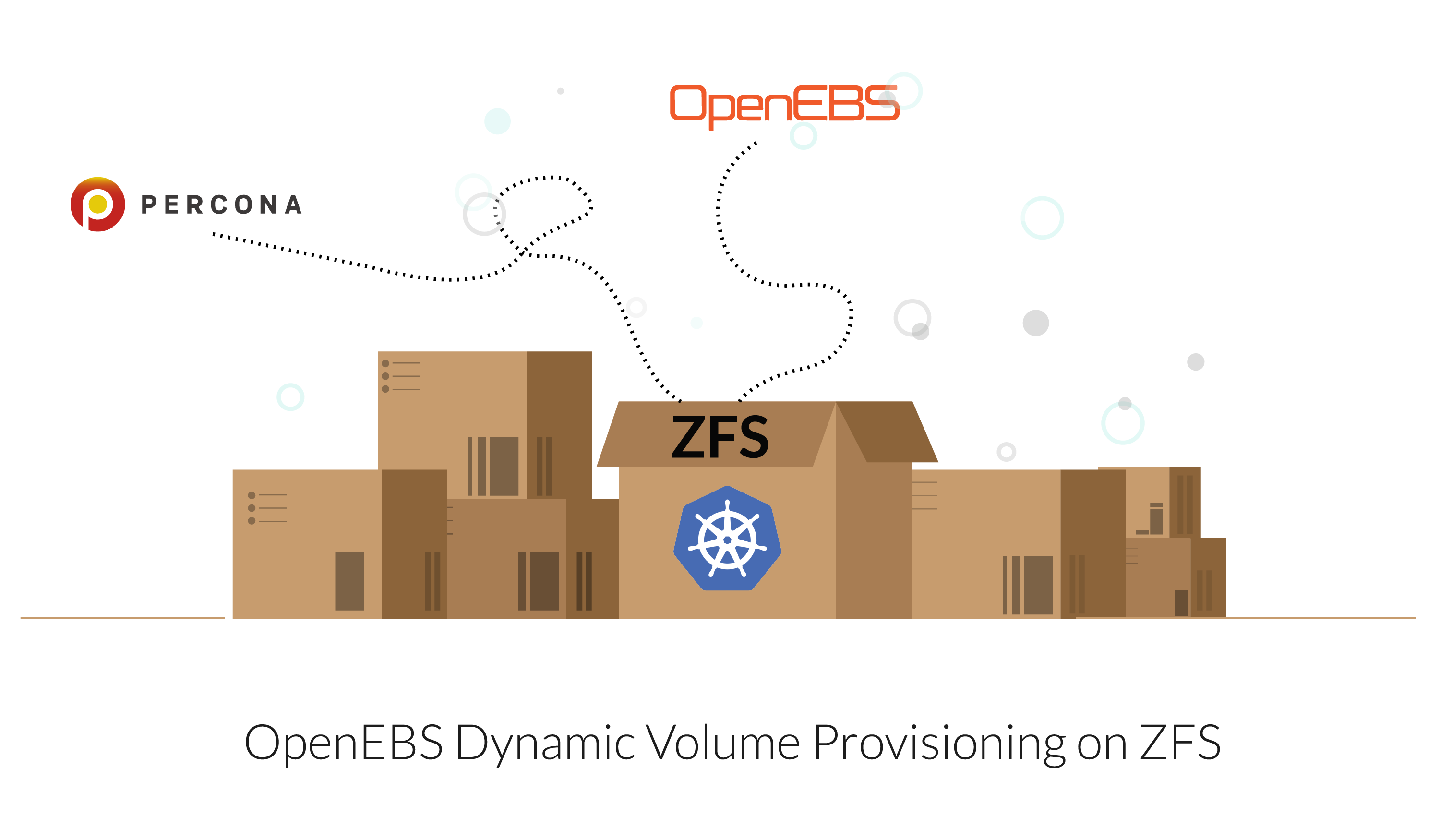Updated September 7th 2021: This blog is updated with the the latest guide on OpenEBS Local PV, please refer to https://github.com/openebs/dynamic-localpv-provisioner.
OpenEBS’ ZFS driver binds a ZFS file system into a Kubernetes environment and allows users to provision and de-provision volumes dynamically. This blog will demonstrate how to deploy a Percona application on the ZFS storage system with OpenEBS.

Using a ZFS Local PV has the following advantages — as opposed to Kubernetes native Local PV backed by direct attached devices:
- Sharing of the devices among multiple application pods.
- Enforcing quota on the volumes, making sure the pods don’t consume more than the capacity allocated to them.
- Ability to take snapshots of the Local PV
- Ability to sustain the disk failures — using the ZPOOL RAID functionality
- Ability to use data services like compression and encryption.
In this post, I will demonstrate how we can use ZFS Local PV for deploying a Percona application.
Setup
We will be using GKE with Kubernetes 1.14+ version with Ubuntu 18.4 installed on each node. We have to set up the node with ZFS utility once the cluster is up and running. We need to install zfsutils-linux on each node and use ZFS commands to set up a storage pool.
$ apt-get install -y zfsutils-linux
Create and Attach the disk (if not already attached) to the nodes for setting up the ZPOOL:
$ gcloud compute disks create --size --type pd-standard --zone us-central1-a
$ gcloud compute instances attach-disk --disk --zone us-central1-aCreate the zpool using the attached disks (sdb and sdc):
$ zpool create zfspv-pool mirror /dev/sdb /dev/sdc
Here we are creating a mirrored ZPOOL, we can create any kind of pool as per our requirement (raidz, striped or mirror).
Check the zpool list:
$ zfs list
NAME USED AVAIL REFER MOUNTPOINT
zfspv-pool 644K 96.4G 176K /zfspv-poolInstall OpenEBS ZFS driver :
$ kubectl apply -f https://raw.githubusercontent.com/openebs/zfs-localpv/master/deploy/zfs-operator.yamlCheck that the driver is installed:
$ kubectl get pods -n kube-system -l role=openebs-zfs
NAME READY STATUS RESTARTS AGE
openebs-zfs-controller-0 4/4 Running 0 5h28m
openebs-zfs-node-4d94n 2/2 Running 0 5h28m
openebs-zfs-node-gssh8 2/2 Running 0 5h28m
openebs-zfs-node-twmx8 2/2 Running 0 5h28m
Create The Storage Class:
$ cat sc.yaml
apiVersion: storage.k8s.io/v1
kind: StorageClass
metadata:
name: percona-sc
allowVolumeExpansion: true
parameters:
poolname: "zfspv-pool"
provisioner: zfs.csi.openebs.ioThe storage class has a poolname parameter, which means that any volume provisioned using this storage class will be provisioned in this pool (zfspv-pool here). The provisioner zfs.csi.openebs.io is the provisioner name for the ZFS driver. You can change the poolname to the name of the ZPOOL which you have created for the provisioning. Apply the YAML to create the storage class:
$ kubectl apply -f sc.yaml
storageclass.storage.k8s.io/percona-sc created
Create The PVC:
kind: PersistentVolumeClaim
apiVersion: v1
metadata:
name: percona-pvc
spec:
storageClassName: percona-sc
accessModes:
- ReadWriteOnce
resources:
requests:
storage: 4GiCreate the PVC using the storage class created for the ZFS driver. You can request for the storage space via storage parameter as shown in above PVC for putting a request for 4Gi storage. Apply the YAML to create the PVC request.
$ kubectl apply -f pvc.yaml
persistentvolumeclaim/percona-pvcCheck the PVC
$ kubectl get pvc
NAME STATUS VOLUME CAPACITY ACCESS MODES STORAGECLASS AGE
percona-pvc Bound pvc-ecdb16e2-e03a-11e9-b418–42010a80006b 4Gi RWO percona-sc 5m39sHere, we can see that the PVC has been created and bound also as well.
Percona YAML:
apiVersion: v1
kind: ConfigMap
metadata:
annotations:
name: sqltest
namespace: default
data:
sql-test.sh: |
#!/bin/bash
DB_PREFIX="Inventory"
DB_SUFFIX=`echo $(mktemp) | cut -d '.' -f 2`
DB_NAME="${DB_PREFIX}_${DB_SUFFIX}"
echo -e "\nWaiting for mysql server to start accepting connections.."
retries=10;wait_retry=30
for i in `seq 1 $retries`; do
mysql -uroot -pk8sDem0 -e 'status' > /dev/null 2>&1
rc=$?
[ $rc -eq 0 ] && break
sleep $wait_retry
done
if [ $rc -ne 0 ];
then
echo -e "\nFailed to connect to db server after trying for $(($retries * $wait_retry))s, exiting\n"
exit 1
fi
mysql -uroot -pk8sDem0 -e "CREATE DATABASE $DB_NAME;"
mysql -uroot -pk8sDem0 -e "CREATE TABLE Hardware (id INTEGER, name VARCHAR(20), owner VARCHAR(20),description VARCHAR(20));" $DB_NAME
mysql -uroot -pk8sDem0 -e "INSERT INTO Hardware (id, name, owner, description) values (1, "dellserver", "basavaraj", "controller");" $DB_NAME
mysql -uroot -pk8sDem0 -e "DROP DATABASE $DB_NAME;"
---
apiVersion: apps/v1
kind: Deployment
metadata:
name: percona
labels:
name: percona
spec:
replicas: 1
selector:
matchLabels:
name: percona
template:
metadata:
labels:
name: percona
spec:
containers:
- resources:
name: percona
image: openebs/tests-custom-percona:latest
imagePullPolicy: IfNotPresent
args:
- "--ignore-db-dir"
- "lost+found"
env:
- name: MYSQL_ROOT_PASSWORD
value: k8sDem0
ports:
- containerPort: 3306
name: percona
volumeMounts:
- mountPath: /var/lib/mysql
name: demo-vol1
- mountPath: /sql-test.sh
subPath: sql-test.sh
name: sqltest-configmap
livenessProbe:
exec:
command: ["bash", "sql-test.sh"]
initialDelaySeconds: 30
periodSeconds: 1
timeoutSeconds: 10
volumes:
- name: demo-vol1
persistentVolumeClaim:
claimName: percona-pvc
- name: sqltest-configmap
configMap:
name: sqltest
---
apiVersion: v1
kind: Service
metadata:
name: percona-mysql
labels:
name: percona-mysql
spec:
ports:
- port: 3306
targetPort: 3306
selector:
name: perconaApply the configuration:
$ kubectl apply -f percona.yaml
configmap/sqltest created
deployment.apps/percona created
service/percona-mysql createdCheck the status of the Pod.
$ kubectl get po
NAME READY STATUS RESTARTS AGE
percona-7456dc6f7b-nnfcz 1/1 Running 0 67sWe can go the node where percona pod is scheduled and see that a volume has been created in the pool zfspv-pool using the ZFS list command,:-
$ zfs list
NAME USED AVAIL REFER MOUNTPOINT
zfspv-pool 115M 96.3G 176K /zfspv-pool
zfspv-pool/pvc-ecdb16e2-e03a-11e9-b418–42010a80006b 102M 96.3G 102M -
Summary
As demonstrated in this blog, OpenEBS makes it easy for the Kubernetes applications to take advantage of all the technical features provided by ZFS storage.
Important links
https://github.com/openebs/zfs-localpv
Please drop your valuable comments or feed backs in the comment section below.






Game changer in Container and Storage Paradigm- MayaData gets acquired by DataCore Software
Don Williams
Don Williams
Managing Ephemeral Storage on Kubernetes with OpenEBS
Kiran Mova
Kiran Mova
Understanding Persistent Volumes and PVCs in Kubernetes & OpenEBS
Murat Karslioglu
Murat Karslioglu